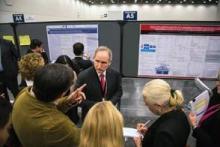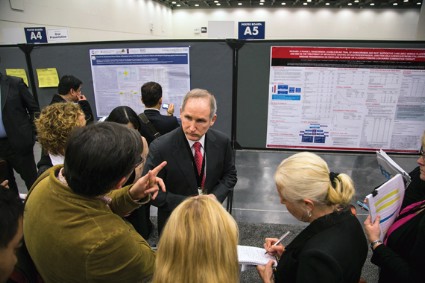User login
SAN FRANCISCO – A phase III clinical trial of an experimental monoclonal antibody for patients failing first-line treatment of metastatic gastric or gastroesophageal junction adenocarcinoma increased median overall survival to 5.2 months, compared with 3.8 months on placebo.
The difference was statistically significant and the treatment effect generally was consistent across major subgroups of the 355 patients in the international, prospective, double-blind trial. At 6 months, 42% of patients on ramucirumab and 32% on placebo were alive. At 12 months, 18% on ramucirumab and 11% on placebo were alive, Dr. Charles S. Fuchs and his associates reported in a poster presentation at a meeting on gastrointestinal cancers sponsored by the American Society of Clinical Oncology (ASCO).
Ramucirumab is a fully human IgG1 monoclonal antibody receptor antagonist designed to inhibit the receptor for vascular endothelial cell growth factor (VEGF), which is believed to contribute to gastric cancer pathogenesis.
The study randomized 238 patients to second-line treatment with IV ramucirumab 8 mg/kg plus best supportive care or placebo plus best supportive care every 2 weeks until disease progression, unacceptable toxicity, or death. All patients had shown disease progression within 4 months of treatment for metastatic disease or within 6 months of adjuvant therapy using first-line regimens containing platinum and/or fluoropyrimidine.
Among secondary outcomes, patients in the ramucirumab group showed a significantly longer interval to disease progression – 2.1 months, compared with 1.3 months on placebo – the intent-to-treat analysis found. At 12 weeks, 40% of patients in the ramucirumab group and 16% on placebo showed no disease progression, reported Dr. Fuchs, director of the gastrointestinal cancer center at the Dana Farber Cancer Institute, Boston.
Overall, 49% of patients on ramucirumab showed a complete or partial response or stable disease, compared with 23% on placebo, a significant difference.
Two patients in each group did not receive the drug or placebo. Among 351 patients who did, the proportions that died because of an adverse event were similar between groups – 11% on ramucirumab and 13% on placebo. The two groups did not differ significantly in rates of most individual adverse events, most commonly fatigue, abdominal pain, decreased appetite, or vomiting. Hypertension was more likely to develop in the ramucirumab group than the placebo group (16% vs. 8%), and grade 3 or higher hypertension was more common on ramucirumab (8% vs. 3% on placebo), though no patients on ramucirumab developed grade 4 hypertension.
No unexpected or new findings regarding safety were seen, Dr. Fuchs reported. Hypertension is one of the adverse events generally associated with antiangiogenic agents and therapeutic antibodies. Rates did not differ between groups for other adverse events of special interest with these agents, including bleeding/hemorrhage, arteriothromboembolic or venous thrombolic events, proteinuria, GI perforation, fistula, and others.
Patient characteristics were similar between the groups at baseline.
The study enrolled patients at 120 centers in 30 countries on six continents.
Ramucirumab is a potential new second-line treatment for patients with metastatic adenocarcinoma of the stomach or the gastroesophageal junction, Dr. Fuchs suggested.
The symposium was cosponsored by ASCO, the American Gastroenterological Association Institute, the American Society for Radiation Oncology, and the Society of Surgical Oncology.
The study was funded by ImClone Systems, a subsidiary of Eli Lilly and Co., which is developing ramucirumab. Some of Dr. Fuchs’ associates in the study disclosed employment or other financial relationships with ImClone Systems and stock ownership in Eli Lilly. Dr. Fuchs has been an advisor to Amgen, Bayer, Bristol-Myers Squibb, Genentech, Infinity Pharmaceuticals, Metamark Genetics, Momenta Pharmaceuticals, Pfizer, Roche, and Sanofi.
On Twitter @sherryboschert
Charles S. Fuchs, gastrointestinal cancers sponsored by the American Society of Clinical Oncology, ASCO
SAN FRANCISCO – A phase III clinical trial of an experimental monoclonal antibody for patients failing first-line treatment of metastatic gastric or gastroesophageal junction adenocarcinoma increased median overall survival to 5.2 months, compared with 3.8 months on placebo.
The difference was statistically significant and the treatment effect generally was consistent across major subgroups of the 355 patients in the international, prospective, double-blind trial. At 6 months, 42% of patients on ramucirumab and 32% on placebo were alive. At 12 months, 18% on ramucirumab and 11% on placebo were alive, Dr. Charles S. Fuchs and his associates reported in a poster presentation at a meeting on gastrointestinal cancers sponsored by the American Society of Clinical Oncology (ASCO).
Ramucirumab is a fully human IgG1 monoclonal antibody receptor antagonist designed to inhibit the receptor for vascular endothelial cell growth factor (VEGF), which is believed to contribute to gastric cancer pathogenesis.
The study randomized 238 patients to second-line treatment with IV ramucirumab 8 mg/kg plus best supportive care or placebo plus best supportive care every 2 weeks until disease progression, unacceptable toxicity, or death. All patients had shown disease progression within 4 months of treatment for metastatic disease or within 6 months of adjuvant therapy using first-line regimens containing platinum and/or fluoropyrimidine.
Among secondary outcomes, patients in the ramucirumab group showed a significantly longer interval to disease progression – 2.1 months, compared with 1.3 months on placebo – the intent-to-treat analysis found. At 12 weeks, 40% of patients in the ramucirumab group and 16% on placebo showed no disease progression, reported Dr. Fuchs, director of the gastrointestinal cancer center at the Dana Farber Cancer Institute, Boston.
Overall, 49% of patients on ramucirumab showed a complete or partial response or stable disease, compared with 23% on placebo, a significant difference.
Two patients in each group did not receive the drug or placebo. Among 351 patients who did, the proportions that died because of an adverse event were similar between groups – 11% on ramucirumab and 13% on placebo. The two groups did not differ significantly in rates of most individual adverse events, most commonly fatigue, abdominal pain, decreased appetite, or vomiting. Hypertension was more likely to develop in the ramucirumab group than the placebo group (16% vs. 8%), and grade 3 or higher hypertension was more common on ramucirumab (8% vs. 3% on placebo), though no patients on ramucirumab developed grade 4 hypertension.
No unexpected or new findings regarding safety were seen, Dr. Fuchs reported. Hypertension is one of the adverse events generally associated with antiangiogenic agents and therapeutic antibodies. Rates did not differ between groups for other adverse events of special interest with these agents, including bleeding/hemorrhage, arteriothromboembolic or venous thrombolic events, proteinuria, GI perforation, fistula, and others.
Patient characteristics were similar between the groups at baseline.
The study enrolled patients at 120 centers in 30 countries on six continents.
Ramucirumab is a potential new second-line treatment for patients with metastatic adenocarcinoma of the stomach or the gastroesophageal junction, Dr. Fuchs suggested.
The symposium was cosponsored by ASCO, the American Gastroenterological Association Institute, the American Society for Radiation Oncology, and the Society of Surgical Oncology.
The study was funded by ImClone Systems, a subsidiary of Eli Lilly and Co., which is developing ramucirumab. Some of Dr. Fuchs’ associates in the study disclosed employment or other financial relationships with ImClone Systems and stock ownership in Eli Lilly. Dr. Fuchs has been an advisor to Amgen, Bayer, Bristol-Myers Squibb, Genentech, Infinity Pharmaceuticals, Metamark Genetics, Momenta Pharmaceuticals, Pfizer, Roche, and Sanofi.
On Twitter @sherryboschert
SAN FRANCISCO – A phase III clinical trial of an experimental monoclonal antibody for patients failing first-line treatment of metastatic gastric or gastroesophageal junction adenocarcinoma increased median overall survival to 5.2 months, compared with 3.8 months on placebo.
The difference was statistically significant and the treatment effect generally was consistent across major subgroups of the 355 patients in the international, prospective, double-blind trial. At 6 months, 42% of patients on ramucirumab and 32% on placebo were alive. At 12 months, 18% on ramucirumab and 11% on placebo were alive, Dr. Charles S. Fuchs and his associates reported in a poster presentation at a meeting on gastrointestinal cancers sponsored by the American Society of Clinical Oncology (ASCO).
Ramucirumab is a fully human IgG1 monoclonal antibody receptor antagonist designed to inhibit the receptor for vascular endothelial cell growth factor (VEGF), which is believed to contribute to gastric cancer pathogenesis.
The study randomized 238 patients to second-line treatment with IV ramucirumab 8 mg/kg plus best supportive care or placebo plus best supportive care every 2 weeks until disease progression, unacceptable toxicity, or death. All patients had shown disease progression within 4 months of treatment for metastatic disease or within 6 months of adjuvant therapy using first-line regimens containing platinum and/or fluoropyrimidine.
Among secondary outcomes, patients in the ramucirumab group showed a significantly longer interval to disease progression – 2.1 months, compared with 1.3 months on placebo – the intent-to-treat analysis found. At 12 weeks, 40% of patients in the ramucirumab group and 16% on placebo showed no disease progression, reported Dr. Fuchs, director of the gastrointestinal cancer center at the Dana Farber Cancer Institute, Boston.
Overall, 49% of patients on ramucirumab showed a complete or partial response or stable disease, compared with 23% on placebo, a significant difference.
Two patients in each group did not receive the drug or placebo. Among 351 patients who did, the proportions that died because of an adverse event were similar between groups – 11% on ramucirumab and 13% on placebo. The two groups did not differ significantly in rates of most individual adverse events, most commonly fatigue, abdominal pain, decreased appetite, or vomiting. Hypertension was more likely to develop in the ramucirumab group than the placebo group (16% vs. 8%), and grade 3 or higher hypertension was more common on ramucirumab (8% vs. 3% on placebo), though no patients on ramucirumab developed grade 4 hypertension.
No unexpected or new findings regarding safety were seen, Dr. Fuchs reported. Hypertension is one of the adverse events generally associated with antiangiogenic agents and therapeutic antibodies. Rates did not differ between groups for other adverse events of special interest with these agents, including bleeding/hemorrhage, arteriothromboembolic or venous thrombolic events, proteinuria, GI perforation, fistula, and others.
Patient characteristics were similar between the groups at baseline.
The study enrolled patients at 120 centers in 30 countries on six continents.
Ramucirumab is a potential new second-line treatment for patients with metastatic adenocarcinoma of the stomach or the gastroesophageal junction, Dr. Fuchs suggested.
The symposium was cosponsored by ASCO, the American Gastroenterological Association Institute, the American Society for Radiation Oncology, and the Society of Surgical Oncology.
The study was funded by ImClone Systems, a subsidiary of Eli Lilly and Co., which is developing ramucirumab. Some of Dr. Fuchs’ associates in the study disclosed employment or other financial relationships with ImClone Systems and stock ownership in Eli Lilly. Dr. Fuchs has been an advisor to Amgen, Bayer, Bristol-Myers Squibb, Genentech, Infinity Pharmaceuticals, Metamark Genetics, Momenta Pharmaceuticals, Pfizer, Roche, and Sanofi.
On Twitter @sherryboschert
Charles S. Fuchs, gastrointestinal cancers sponsored by the American Society of Clinical Oncology, ASCO
Charles S. Fuchs, gastrointestinal cancers sponsored by the American Society of Clinical Oncology, ASCO
AT A MEETING ON GASTROINTESTINAL CANCERS SPONSORED BY THE AMERICAN SOCIETY OF CLINICAL ONCOLOGY
Major Finding: Patients who failed first-line treatment for metastatic gastric or gastroesophageal junction adenocarcinoma lived a median of 5.2 months on second-line treatment with ramucirumab or 3.8 months on placebo.
Data Source: International, randomized, double-blind trial in 355 patients.
Disclosures: The study was funded by ImClone Systems, a subsidiary of Eli Lilly and Co., which is developing ramucirumab. Some of Dr. Fuchs’ associates in the study disclosed employment or other financial relationships with ImClone Systems and stock ownership in Eli Lilly. Dr. Fuchs has been an advisor to Amgen, Bayer, Bristol-Myers Squibb, Genentech, Infinity Pharmaceuticals, Metamark Genetics, Momenta Pharmaceuticals, Pfizer, Roche, and Sanofi.

